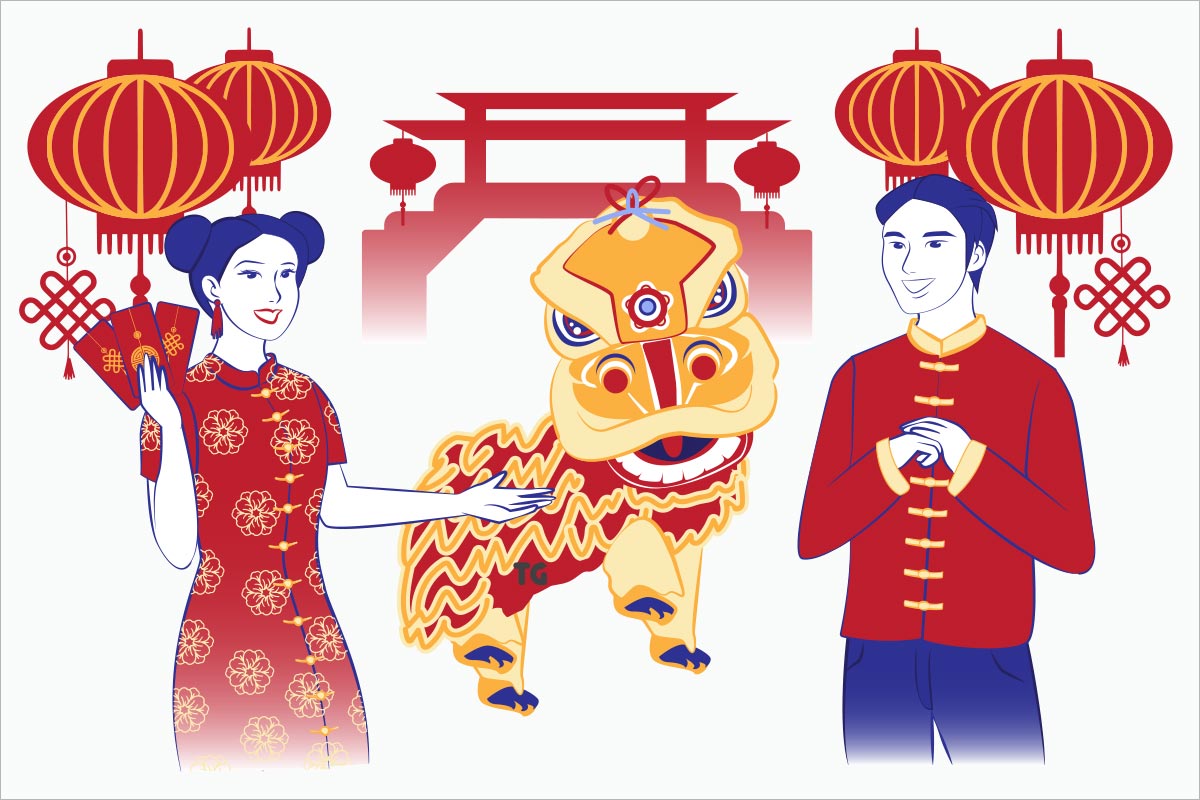Lunar New Year might be an unfamiliar concept to Westerners like you. Many Asian countries — Thailand included — celebrate this day as gloriously as the International New Year itself. However, Thailand has its unique ways of celebration, distinguishable from other Asian nations.
The Thais refer to Lunar New Year as Chinese New Year and celebrate it annually. The celebration takes place for three days. Each day has different practices and ceremonies. The most important day among the three is arguably the 2nd day when they pay respect to deities, ancestors, and spirits.
The Lunar New Year celebration in Thailand gradually changes throughout the year. Some households might celebrate it differently from others.
Read on to learn the key elements that make up the Thai Chinese New Year celebration.
Does Thailand celebrate Lunar New Year?
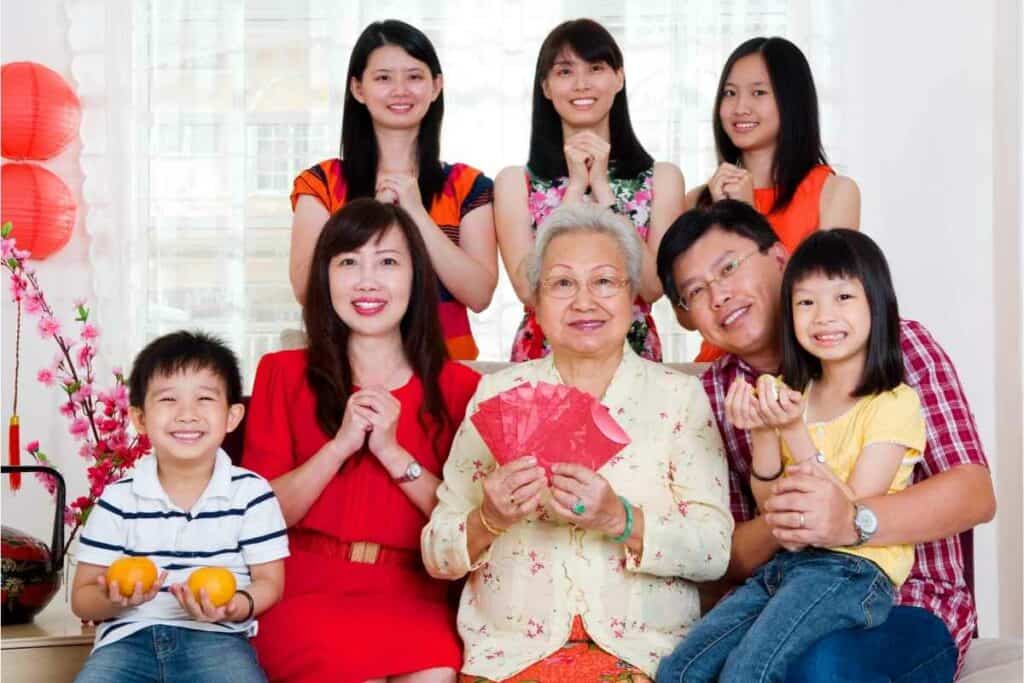
Thailand sees a big Lunar New Year celebration annually. The Thais call this celebration “ตรุษจีน” (Troot Jean), meaning: Chinese New Year.
While most spiritual ceremonies are performed exclusively by Chinese-Thai families, everyone can still feel the impact of these special days.
The reason for the glorious Lunar New Year celebration is simple: there are tons of people of Chinese descent in Thailand. They make up more than 10% of the population. (Source)
In 2017, a survey showed that Chinese-Thai people spend around 1.3 million THB for the celebration — 6,200 THB per family. (Source)
The origin of these Chinese goes back to the Ayutthaya kingdom (1351-1767). Some of them came to Thailand to trade. The others came as political refugees. (Source)
Lunar New Year occurs on different dates each year. This festival is not based on the Gregorian calendar but on the Chinese Lunar calendar (which also differs from the Thai Lunar calendar). People celebrate Chinese New Year on the first spring day, around late January to early February. (Source)
In Thailand, the celebration itself lasts for three days. Each day has different names, practices, and ceremonies to follow.
The 1st day is called “วันจ่าย” (Wan Jaai), or Shopping day — the most simple day among the three. It is one day before New Year’s Eve, and people buy food and other necessities for the ceremony of the upcoming days.
The 2nd day is “วันไหว้” (Wan Wai), or Paying respect day. As the name suggests, this is when people perform ceremonies — paying respect to Chinese deities, passed away family members, and other wandering ghosts and spirits. This Chinese New Year’s eve is arguably the most detail-oriented day of the three.
“วันเที่ยว” (Wan Tiao), or Visiting day, marks the final day of Chinese New Year. People visit their elders and bring the whole family to travel wherever they want. Children would like this day the most out of the three. Not only do they get to travel, but they also receive red envelopes from their relatives. These envelopes contain money for them to use on the New Year. (Source)
How do Thai people celebrate the Chinese New Year?
As you already know, Chinese New Year lasts for three days — Shopping day, Paying Respect day, and Visiting day.
The first and the last day are simple enough to understand. However, you might want to know what and how exactly the Chinese-Thai pay respect.
Generally, you can divide this day into 3 phases: Deity phase, Ancestor phase, and Wandering Ghost phase. (Source)
1. The Deity Phase
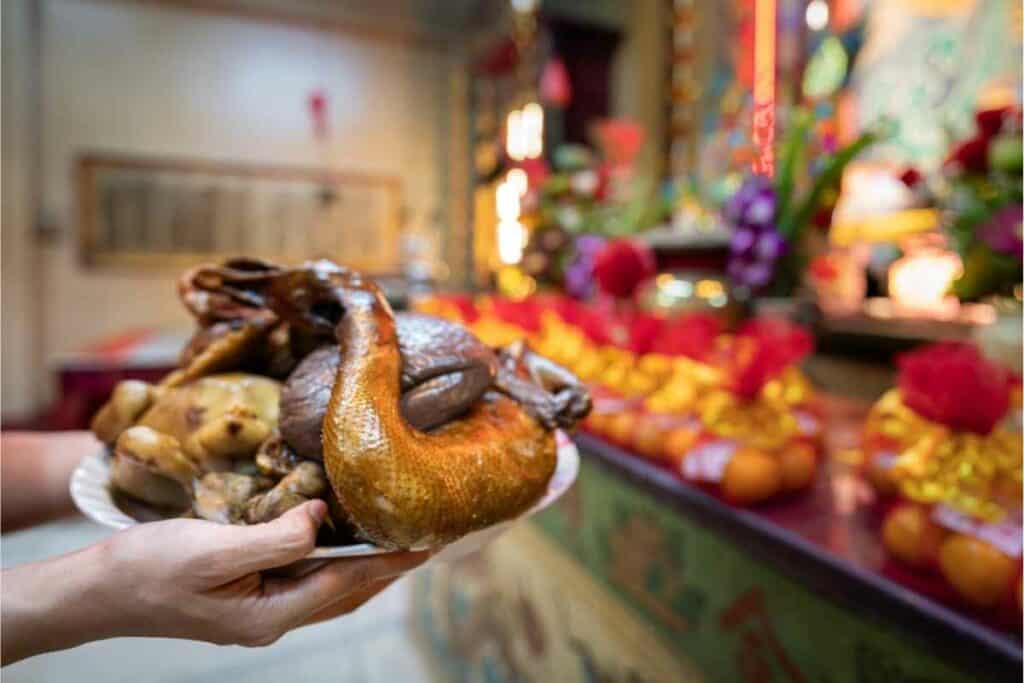
This phase is when people pay respect to Chinese Deities. The ceremony usually happens early in the morning — sometimes even before sunrise. The exact timing depends on the deity you want to address and the Chinese horoscopes.
This phase begins with you setting up the ritual table. There are loads of things you have to offer the gods. These includes:
- The deity statue — Representing the gods themselves
- Incense sticks, candles, and flower
- 5 bowls of rice, and 5 cups of tea and Chinese liquor
- 3 types of meat
- Boiled/Roasted Chicken: signifies grace.
- Boiled Pork: signifies abundance.
- Boiled/Roasted: signifies all-roundedness.
- 3 types of pastries
- 5 types of fruits
- Thai rice flour muffin or “ถ้วยฟู” (Tuai Fuu) — signifies growth and success.
- Chinese New Year cake or “ขนมเข่ง”(Kanom Keng) and stuffed dough pyramid (Kanom Tian) or “ขนมเทียน” — signifies happiness and smoothness.
- Steamed bun or “ซาลาเปา” (Sa-la-pao) signifies the ability to keep your fortune.
- 5 types of fruits
- Orange — represents wealth.
- Banana — represents fertility and numerous children.
- Pineapple — believed to attract fortune.
- Grape — represents growth and success.
- Dragon fruit — represents power.
- Golden and silver papers
(Source)
Keep in mind that the details of these foods and items vary. Each family has its own beliefs and culture, so they may add or take out anything they like. Besides, wealthy families might want to add more menus for more return fortune.
When you finish setting the table, wait for the right time (according to Chinese horoscopes), then light the candles and incense and pray to the gods. During this time, you can ask for blessing and protection.
After praying, you wait a bit for the gods to “feast” on your offering. Then, take the gold and silver papers and burn them as an offering.
The Chinese-Thai believe you will receive whatever you offer the gods as a return favor. So, if they want wealth, they offer money. However, burning money is probably not a good idea. Instead, they use these gold and silver pieces of paper as “money.” (Source)
Don’t burn or eat the food yet. You can repurpose these dishes in the next phase.
2. The Ancestor Phase
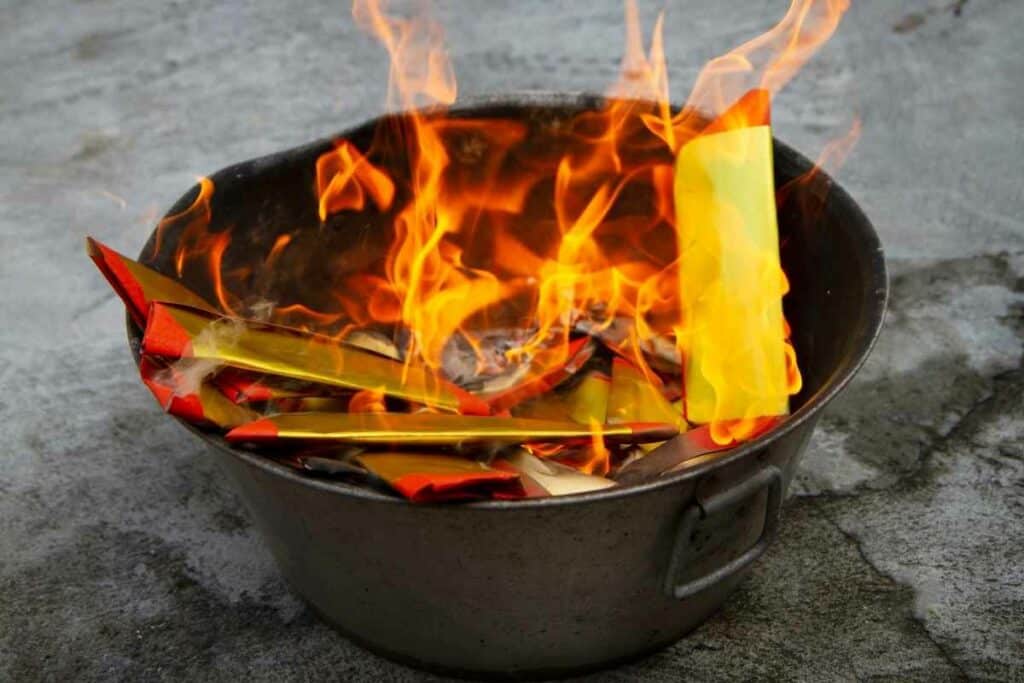
In the late morning, it is time you show respect to your ancestors (passed away relatives included).
The setting and process are pretty much the same as the deity phase. The main difference is you replace the gods’ statues with portraits or pictures of your ancestors. And don’t forget to refill the golden and silver papers. Besides, you can add your relative’s favorite menu to the mix. (Source)
Another important aspect of this phase is burning papers. In the Deity phase, you burn “money” to receive it as a return favor. In this phase, you burn “money” so that your ancestors can spend it in heaven. (Source)
Since the purpose is different, there is an extra step you need to perform. Before burning the golden and silver papers, you must burn a special piece of paper called “อ่วงแซจิ่ว” (Uang Sae Jiw). This yellow and red paper acts as a ticket to open heaven’s gate. Without this ticket, the “money” you burn cannot reach your ancestor. (Source)
3. The Wandering Ghost Phase
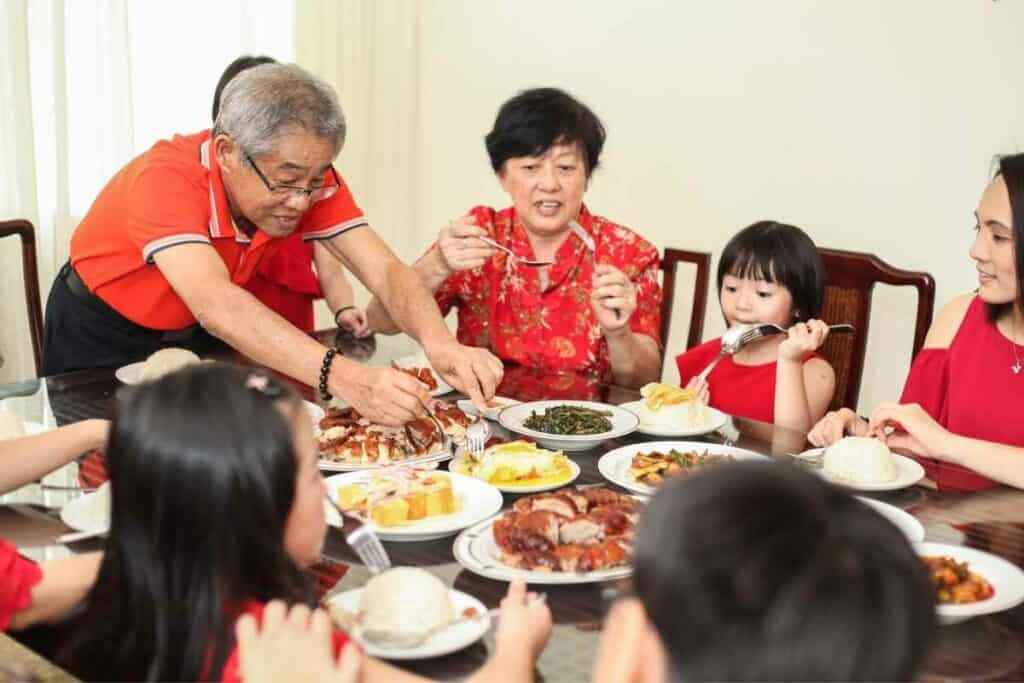
This phase is less like a show of respect but more of a display of generosity.
If you think about it, the ancestor phase is designed for the dead to receive goods from their living relatives. But what about those who don’t have any living children or siblings? Are they doomed to be starved in the afterlife?
That is where this phase comes into play. In the afternoon, you put the leftover food from the deity and ancestor phases in bowls and lay them down on the floor. This way, the wandering ghosts and spirits can feast on them. (Source)
However, keeping these unknown spirits in your house might not be a good idea. So, after letting them eat for a while, don’t forget to light firecrackers to expel them from your home. (Source)
When all phases finish, it’s time for the whole family to enjoy a big meal together. They usually eat what’s left on the table from the gods and their ancestors (which is everything).
The sad thing about this ceremony is that the younger generations seem to know so little about the procedure and the meaning of the ritual itself. Only a handful of them knows how to set the table. And even fewer are aware of what each aspect of the ritual represents.
However, it is unlikely that the Chinese New Year will disappear from Thailand. Thai people love celebrations. They won’t miss a chance to celebrate another day.
Thai Lunar New Year fun facts
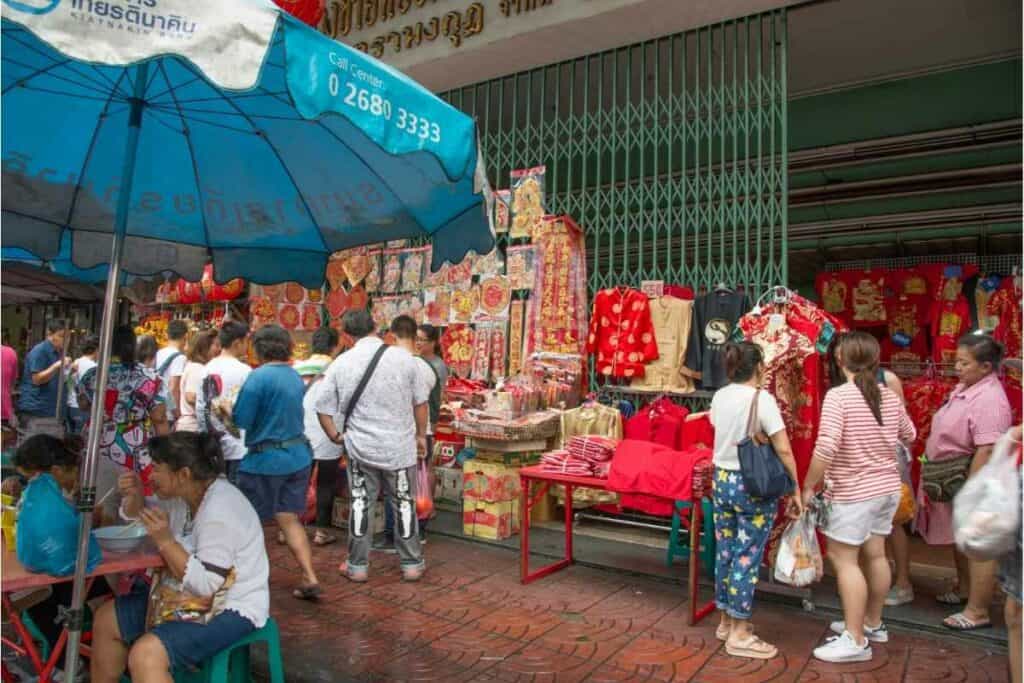
It isn’t a public holiday, but…
Most Thai people still go to work on Lunar New Year. However, some companies with Chinese owners make Chinese New Year a holiday for their employees. And it’s not only that. Some Thai companies even allow you to take leave to celebrate Chinese New Year. After all, it is a family day. They don’t want to force you to work on such a special occasion.
How to say Happy Chinese New Year in Thailand?
There are numerous ways you can say this in Thailand. However, the most well-known phrase is actually in Chinese: “xīnzhèngrǔyì xīnniánfācái.” (Source)
For those who cannot read pinyin (Chinese phonetic alphabet), it reads “Sin Jeng Ruu Ii Sin Niang Fa Chai.”
You can say this to any Thai during the festival. Everyone will understand that you mean Happy Chinese New Year. (But not everyone can say it back accurately, though).
Where to celebrate Chinese New Year
You can see Chinese market events across Thailand. Walk around the place, shop, and eat. There might even be shows like Chinese dances, Chinese lion gymnastics, or Chinese dragon parades. It is recommended you see it with your own eyes once.
Thai Culture and Lunar New Year
More than anything, Lunar New Year in Thailand emphasizes the importance of families. Thai people respect their elders from the bottom of their hearts and will do anything to give back what they have received. That’s why Chinese New Year fits right into Thai culture.
The celebration particulars might vary from house to house, but the essence of the family is still the same.
Like always, if you want to discover more about Thailand, stay guided with ThaiGuider. You might learn something you never knew about this unique country.
THINKING ABOUT A TRIP TO THAILAND?
I am working on a FREE Thailand Travel Guide with a FULL 7 Day Itinerary. Be the first to receive it!
Thank you for signing up.
Something went wrong.
